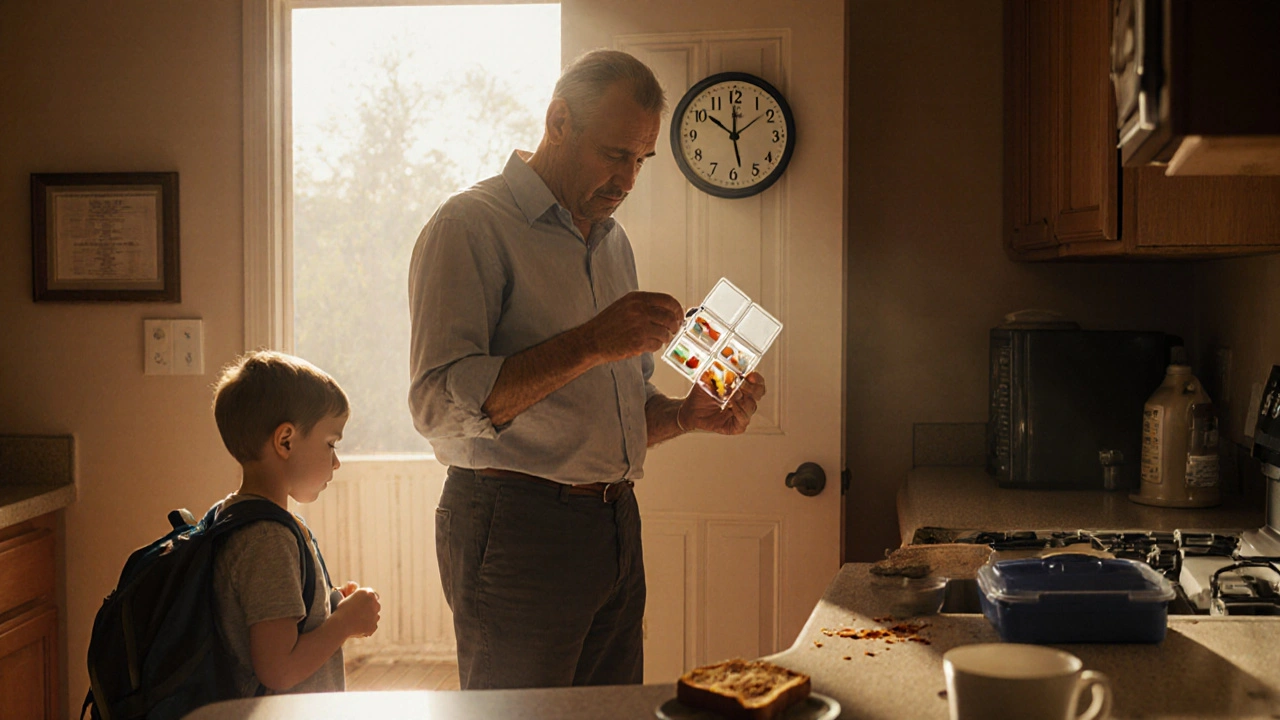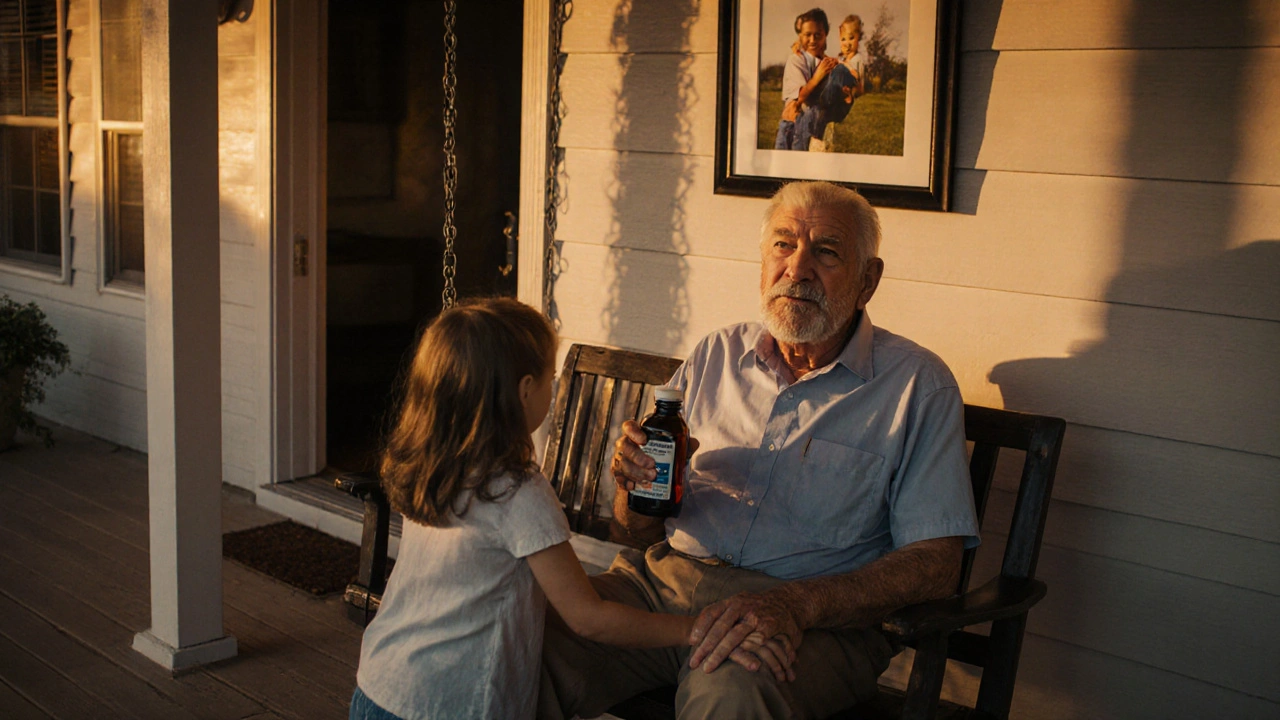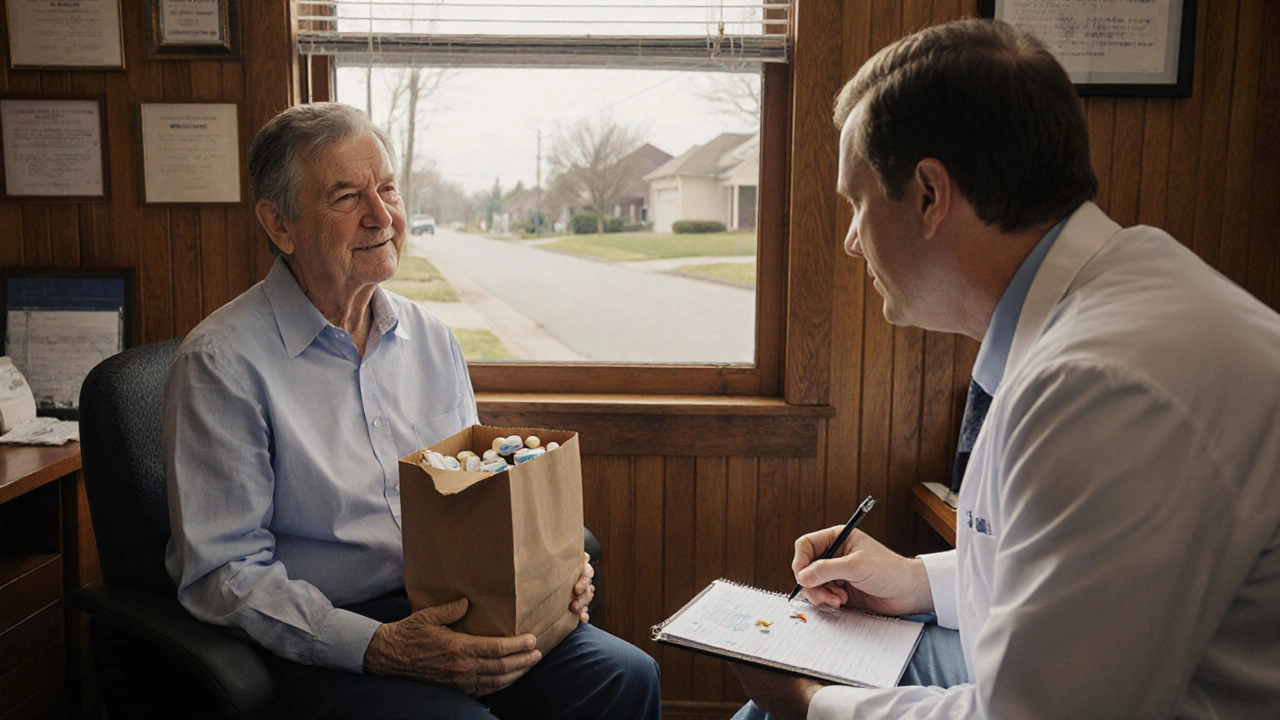Medication Adherence: How to Stick to Your Pills Without Losing Your Life

Medication Adherence Optimizer
This tool estimates how simplifying your medication regimen could improve your adherence and reduce health risks, based on real medical research. Enter your current schedule to see what changes might help.
You’ve been prescribed medication. Your doctor says it’s life-changing. But every morning, you stare at that pill bottle and wonder: Is this worth it?
It’s not laziness. It’s not rebellion. It’s not ignorance. It’s real life.
Half of people with chronic conditions don’t take their meds as prescribed. Not because they don’t care - but because the cost, the side effects, the schedule, and the sheer weight of it all are eating into their days, their sleep, their relationships, their joy.
Doctors talk about adherence like it’s a number: 80% of doses taken. But what does that mean when taking your blood pressure pill makes you so tired you miss your kid’s soccer game? Or when your diabetes meds give you stomach cramps so bad you skip dinner with friends? Or when you’re skipping doses so your pills last until payday?
This isn’t about being a good patient. It’s about being a human.
Why ‘Adherence’ Isn’t Just About Taking Pills
The word ‘compliance’ is gone from medical language for a reason. It made patients sound like robots who should obey orders. Today, we say ‘adherence’ - because it means you’re choosing, every day, whether to take the medicine.
The World Health Organization defines it as how closely your behavior matches what you and your provider agreed on. That’s key: you agreed. Not just got handed a script.
Adherence isn’t just about how many pills you swallow. It’s also about persistence - whether you keep taking them over months and years. And here’s the hard truth: most people stop. Not because they forget. Because they feel worse taking the medicine than they do living with the disease.
One study found that for every extra pill you have to take each day, adherence drops by 26%. So if you’re on five pills a day, you’re already fighting a 78% uphill battle. That’s not a patient problem. That’s a system problem.
The Real Cost of Skipping Doses
Skipping your meds sounds harmless. One day won’t hurt, right?
Wrong.
In the U.S., non-adherence causes 125,000 deaths every year. That’s more than traffic accidents. It leads to 10-25% of hospital admissions - many of them preventable.
For people with high blood pressure, missing doses raises heart attack risk by 2.5 times. For diabetics, it spikes A1c levels by 28% and increases complications like nerve damage and vision loss. These aren’t abstract risks. They’re real outcomes: lost mobility, dialysis, amputations, early death.
And the financial toll? Between $100 billion and $289 billion a year in avoidable hospital bills, ER visits, and long-term care.
But here’s the paradox: the very drugs meant to save you can make life feel less worth living.
Side Effects Are the Silent Killer of Adherence
Twenty to thirty percent of people stop their meds because of side effects. Not because they’re stubborn. Because they’re exhausted, nauseated, dizzy, or numb.
Think about it:
- Diuretics for heart failure mean you’re running to the bathroom every hour - no matter the event, the meeting, the road trip.
- Statins for cholesterol can cause muscle pain so bad you can’t lift your arms to hug your grandchild.
- Antidepressants might lift your mood but kill your sex drive - and you’re not going to tell your doctor that.
- Painkillers make you foggy. You miss work. You feel like a ghost in your own life.
Patients on Reddit’s r/ChronicPain forum say 68% of them deliberately reduce opioid doses before family gatherings - not because they don’t want relief, but because they want to be present. Not sedated.
On PatientsLikeMe, 42% of 15,000+ users admitted adjusting their regimens because side effects ruined daily life. Gastro issues. Drowsiness. Sexual dysfunction. These aren’t rare complaints. They’re the norm.
And yet, too many providers dismiss these concerns with: “Just take it.”

Quality of Life Isn’t a Luxury - It’s the Goal
Medicine was never meant to trade your life for more years. It was meant to give you back your life.
Imagine this: You’re on a pill schedule that forces you to wake up at 6 a.m. to take your meds, then again at noon and 8 p.m. You’re a single parent. Your job starts at 7. Your kid has school drop-off at 8. You’re already running on fumes. Now you’re also juggling pills like a circus act.
What if your doctor switched you to a once-daily version? You’d sleep better. You’d be calmer. You’d be more present. Your adherence might jump from 55% to 92% - not because you suddenly became disciplined, but because the plan finally fit your life.
That’s what works.
A Diabetes Forum study found patients whose insulin timing was adjusted to match their work shifts had 37% higher adherence. Not because they were more motivated. Because the treatment respected their reality.
Adherence isn’t about perfect numbers. It’s about sustainable living.
What Actually Helps - And What Doesn’t
Most adherence programs fail because they focus on the wrong thing: getting you to take more pills. But the real fix isn’t more reminders. It’s better fit.
Here’s what works:
- Simplify the regimen. Switching from three pills a day to one reduces non-adherence by 28%. Once-daily drugs? Game-changer.
- Lower the cost. One in four Americans skip doses because they can’t afford them. Generic alternatives, patient assistance programs, and pharmacy discount cards can make a difference.
- Use a pill organizer. It boosts adherence by 22%. But only if you can manage it. For someone with arthritis or dementia, it’s another burden.
- Try digital tools. Apps like Medisafe help - but only 28% of people over 65 keep using them after three months. Tech only works if it’s simple and human.
- Ask for a brown bag review. Bring all your meds - supplements, OTC, old prescriptions - to your next appointment. Doctors spot issues in 63% of cases.
But the most powerful tool? Conversation.
Doctors trained in motivational interviewing - asking open questions like, “What’s the hardest part about taking these pills?” - see adherence improve by 24%. Not because they pressured patients. Because they listened.

What You Can Do Right Now
You don’t need to be perfect. You just need to be honest.
Here’s how to start:
- Write down your real reasons for skipping. Is it the side effect? The cost? The timing? Write it out. Don’t judge it. Just name it.
- Bring it to your next appointment. Say: “I want to take these as prescribed, but here’s what’s getting in the way.”
- Ask: “Is there a simpler way?” Can we switch to a once-daily version? A patch? An injection? A different drug with fewer side effects?
- Request a cost check. Ask if there’s a generic. A coupon. A patient assistance program. Many drugs have them - you just have to ask.
- Negotiate flexibility. “I need to take my blood pressure pill every day, but I can’t take it at 8 p.m. if I’m at my daughter’s recital. Can I take it at 6 p.m. instead?”
There’s no shame in wanting to feel good while you’re healing. That’s not defiance. That’s wisdom.
The Future Is Personalized Adherence
The FDA now requires drug makers to study how their meds affect daily life - not just lab numbers. That’s new. That’s progress.
Emerging tools like smart pill bottles and ingestible sensors sound high-tech. But 68% of patients refuse them because they feel like surveillance. We don’t need tracking. We need trust.
The best approach? Adherence tailoring.
Instead of demanding 100% compliance, providers now ask: “Which parts of your regimen are you willing to stick to? Where can we give you space?”
One patient said: “I’ll take my morning pill every day. But I need to skip the evening one if I’m going out.”
The doctor agreed. Adherence jumped to 91%.
That’s the future: not forcing you to fit the medicine - but fitting the medicine to you.
Final Thought: Your Life Matters More Than Your Numbers
Medication adherence isn’t about hitting a target. It’s about finding a rhythm that lets you live.
It’s okay to feel tired from your meds. It’s okay to miss a dose before a big event. It’s okay to ask for help paying for them. It’s okay to say, “This isn’t working for me.”
The goal isn’t to take every pill. The goal is to stay alive - and still enjoy being alive.
So next time you look at that bottle, don’t ask, “Am I being a good patient?”
Ask: “Is this helping me live - or just prolonging my suffering?”
And then, talk to your provider. Not to please them. To save your life - on your terms.
Conor McNamara
November 19, 2025 AT 04:24theyre watchin u u know. the pills have microchips. the pharma co’s got ur data. they dont care if u live or die-just that u keep buyin. i skipped mine for 3 months. my bp went up. then my phone started playin weird tunes at 3am. coincidence? i think not.
steffi walsh
November 20, 2025 AT 15:28thank you for writing this. i’ve been on 7 meds for 5 years and honestly? i cry every morning before i take them. not because i’m weak-because i miss being able to hug my kids without feeling like a zombie. i switched to a once-daily combo last month. i slept through the night for the first time in years. 💙
Leilani O'Neill
November 20, 2025 AT 19:29How utterly irresponsible. People like you are why healthcare costs are exploding. If you can’t follow basic medical instructions, perhaps you shouldn’t be allowed to have prescriptions. This isn’t a self-help blog-it’s medicine. Take the pill. End of story.
Riohlo (Or Rio) Marie
November 22, 2025 AT 10:48Oh, darling, let me unpack this for you like a poorly wrapped gift from a corporate wellness seminar. The real tragedy isn’t non-adherence-it’s the grotesque commodification of human suffering into a KPI. We’ve turned patients into data points while doctors are trained to recite brochures like Siri with a stethoscope. The fact that you’re still asking ‘how to stick to pills’ instead of ‘why does this system make people want to die faster?’ is the real pathology. And yes, I’m talking to you, Dr. Google. 🙃
Shaun Barratt
November 23, 2025 AT 00:36While the emotional resonance of this post is compelling, the statistical claims require substantiation. The 26% adherence drop per additional pill is cited without source. The 125,000 U.S. deaths from non-adherence is referenced in multiple peer-reviewed studies (e.g., JAMA 2004;292:76), but the $100B–$289B cost range is from a 2017 Milken Institute report, which includes indirect costs. Precision matters.
Iska Ede
November 24, 2025 AT 15:14So let me get this straight-you’re telling me the solution to being poisoned by your own medicine is to… ask nicely? And maybe switch to a different poison? Wow. I’m just glad my doctor doesn’t treat me like a toddler who needs a sticker chart for swallowing pills. 🙄
Gabriella Jayne Bosticco
November 25, 2025 AT 17:06I’ve been there. Took my BP meds for 18 months, then stopped because I was so dizzy I couldn’t walk the dog. Felt guilty for months. Then I told my doc: ‘I’ll take it if I can take it at 6 a.m. instead of 8 p.m., and if we can try the patch.’ She said yes. I’ve been on it for 2 years. No dizzy spells. Dog’s happy. I’m happy. It’s not about being perfect. It’s about being heard.
Sarah Frey
November 26, 2025 AT 02:16This is an exceptionally well-articulated perspective that aligns with current patient-centered care models endorsed by the American College of Physicians. The emphasis on individualized therapeutic agreements, rather than binary adherence metrics, represents a paradigm shift toward ethical, sustainable clinical practice. I encourage all clinicians to adopt motivational interviewing frameworks as standard training. The data supports this approach unequivocally.